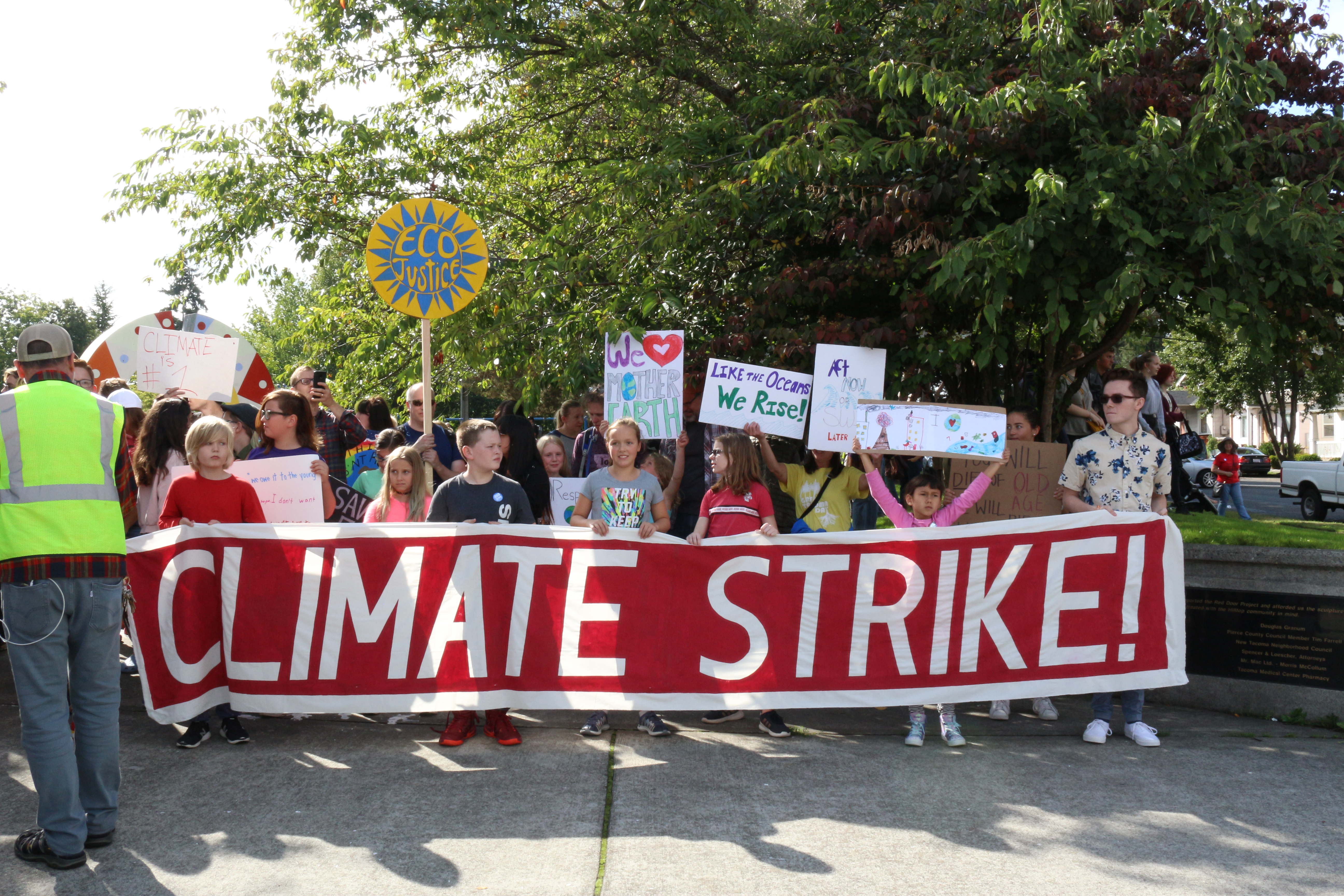Kendan Bendt
Reporter
In support of a worldwide climate strike, over 100 strikers gathered in the People’s Park in Tacoma on Friday, September 20th to participate in chants, songs, and poetry, with a spirited crowd that reacted positively to all of it.
Several protestors carried handmade signs, such as “climate justice,” a reference to the idea that climate change is a moral and political issue, rather than simply a fact of the environment. Those who had not brought signs were encouraged to borrow pre-constructed signs made by the organizers of the rally, or to make their own using available poster board and markers.
The organizers arranged a group picture of the protestors before marching to Tacoma City Hall. Participants hoped to pressure their local politicians into taking action against the climate crisis.
Several slogans and chants were repeated , with the emphasis on a united community running strong throughout the day.
One song goes as follows:
“Solid as a rock
Rooted as a tree
We are here
Standing tall
In a rightful place.”
Many activists emphasized the importance of current and future generations. Older protesters carried signs which made clear that they were there to uplift and support their younger counterparts.
“Climate change affects kids,” Rev. Randall Mullins said, calling it a “much larger crisis than we acknowledge.”
Several more activists underlined the impact climate change will have on the next few generations, as well as the importance of acknowledging its severity.
Other strikers focused on constructive policy to combat climate change.
One protestor, Mackenzie Knapp, said that it is important to combat climate change by “[taking] every action possible” to change or slow its effects, and that it is important for policymakers to seek an “intersection of” the ideas common between “climate change, the economy, and people.”
Striker Mason Williams cited a Stanford study that envisions “100% renewable energy by 2045” for 139 seperate countries.
Many of those in attendance noted the importance of realistic policy to ensure the stability of the movement.
Protesters took particular aim at funding for new unclean energy projects in the US, citing Puget Sound Energy’s Liquid Natural Gas project in the Port of Tacoma as a local culprit.
Protester Ari Vergen, a sophomore at UPS studying Theater and English, focused on the “devastating” effect that “oil drilling [in Alaska]” was having on the communities there.
When asked about which presidential candidate they felt represented their views on climate change the best, strikers interviewed primarily voiced their support for Senator Bernie Sanders and Senator Elizabeth Warren. Some also brought up Washington Governor Jay Inslee, and lamented that he was no longer running.
In 2019, the IPCC, or Intergovernmental Panel on Climate Change (IPCC) (a UN-based group), declared that human activities have already “caused approximately 1.0 [degrees Celsius]of warming above pre-industrial levels,” and that “global warming is likely to reach 1.5 [degrees Celsius] between 2030 and 2052 if it continues to increase at the current rate” in a summarized version of their report to the UN.
If these trends continue, the IPCC warns, there will most likely be increases in “mean temperature in most land and ocean regions… [and] hot extremes in most inhabited regions,” with somewhat less confidence in there being “heavy precipitation in several regions… and the probability of drought and precipitation deficits in some regions.”
The IPCC also urges that policy be centered around “[limiting] global warming to 1.5 [degrees Celsius],” as they have “high confidence” that this will create “clear emissions reductions by 2030,” and emphasizes that there are safe and efficient ways to move towards the goal of limiting global warming to 1.5 degrees Celsius.


















